William Shakespeare Romeo and Juliet
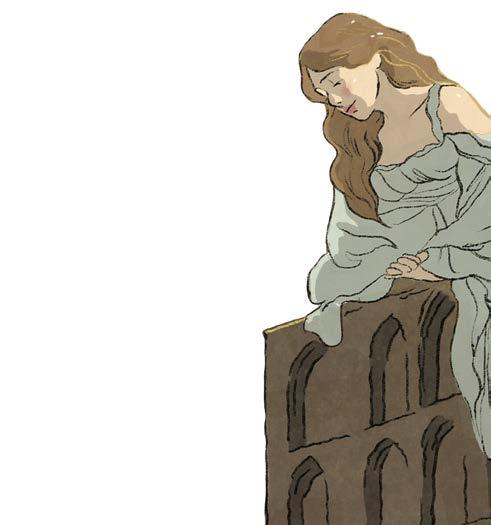
The Pleasure of Reading
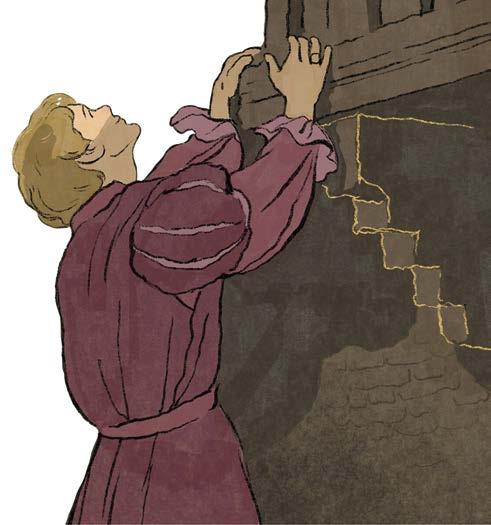

eliGreenwich STAGE 3 B1.2 PRELIMINARY FLIP BOOK + AUDIO MP3
The Greenwich Meridian is the imaginary line that is exactly at 0° longitude: every place on Earth is measured from this line, known as the Prime Meridian. Here, east and west meet.
Just as the Greenwich Meridian is the meeting place between space and time, the eliGreenwich series is the meeting place of all those readers who immerse themselves in different times and spaces in these pages, discovering characters, stories, and real or imaginary worlds. It is a journey that crosses civilizations, seas, and known or unexplored lands, on its ideal route from the North Pole to the South Pole. A journey that is an adventure: the adventure of reading, of losing yourself in the pages of a book.
www.eligreenwich.it
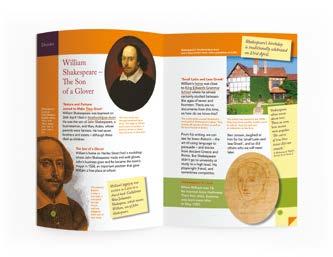
Welcome to Romeo and Juliet
Information about the author, the story and the historical period.
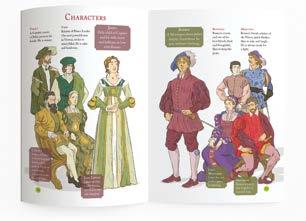
Brief descriptions of the main characters.
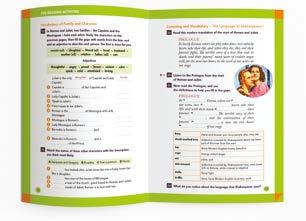
Pre-reading activities.
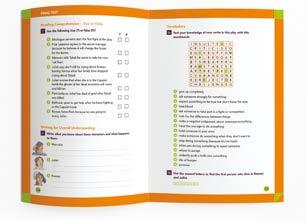
A final test to check what you remember.
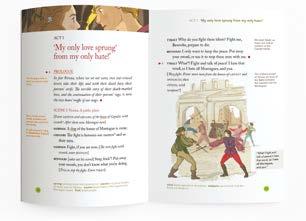
The text with cultural details, brief summaries and glossary.
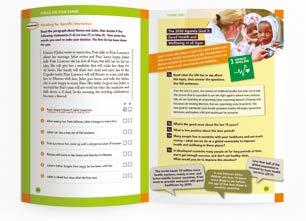
A wide variety of activities covering Cambridge Exam Certificates, State exams, 21st Century Skills and 2030 Agenda topics.
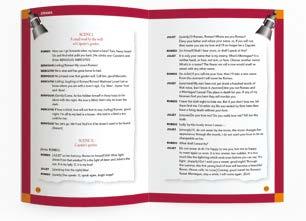
A transcript of two of the most important scenes from the story to act out together in class.
Legenda
PRELIMINARY
INVALSI
Esame di Stato
Costituzione e Cittadinanza
2030
21st Century Skills
Sir Arthur Conan Doyle The Sign of the Four
E. Gaskell, K. Chopin, K. Mansfield, V. Woolf, E.Wharton Portraits of Women
Robert Louis Stevenson The Strange Case of Dr Jekyll and Mr Hyde
Geoffrey Chaucer The Canterbury Tales
Jane Austen Pride and Prejudice
Lewis Carroll Alice in Wonderland
Oscar Wilde The Canterville Ghost
H.G. Wells, G. Orwell, E.A. Poe, S.O. Jewett, V. Woolf One Planet, One Goal
Mary Shelley Frankenstein
George Orwell Animal Farm
K. Mansfield, J. Joyce, O. Wilde, R. Tagore, M. Twain Tales of Friendship
Charlotte Brontë Jane Eyre
Oscar Wilde The Picture of Dorian Gray
H.G. Wells The Time Machine
C. Dickens, E. Wharton, E.M. Forster, W. Sibert Cather, J. London Life is a Journey
Frances Hodgson Burnett The Secret Garden
William Shakespeare Romeo and Juliet
Series Editors Paola Accattoli, Grazia Ancillani
Art Director Daniele Garbuglia
Graphic Design Emilia Coari
Production Manager Francesco Capitano
Photo Credits Shutterstock, Alamy © 2024 ELi, Gruppo editoriale ELi Printed in Italy by Tecnostampa - Pigini Group Printing Division, Loreto-Trevi
24.83.262.0 ENG018.01
ISBN 978-88-536-4373-5 www.gruppoeli.it
Glossario Drama
Agenda
6 Dossier 1 William Shakespeare –The Son of a Glover 10 Characters 12 Pre-reading Activities 16 ACT I ‘My only love sprung from my only hate!’ 24 Activities 28 ACT II ‘Parting is such sweet sorrow.’ 36 Activities 40 ACT III ‘A plague on both your houses.’ 50 Activities 54 ACT IV ‘Cut him out in little stars.’ 64 Activities 68 Dossier 2 Shakespeare’s Theatre –All the World’s a Stage 72 ACT V ‘Romeo, I come! I drink this for you.’ 82 Activities 86 ACT VI ‘And so with a kiss…’ 96 Activities 100 Dossier 3 Romeo and Juliet on Stage 104 Final Test 110 Drama 112 My Book Contents
Shakespeare wrote in Early Modern English where ‘thee’ and ‘thou’ mean you, ‘thy’

William Shakespeare –The Son of a Glover
‘Nature and Fortune Joined to Make Thee Great’
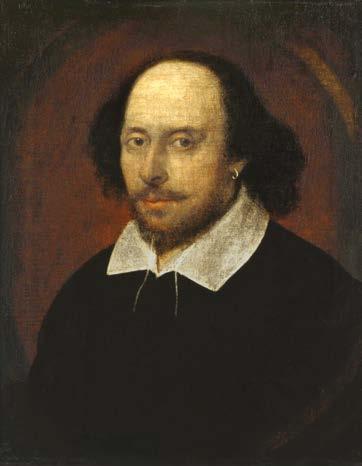

is your, ‘art’ is are.

William Shakespeare was baptised on 26th April 1564 in Stratford-Upon-Avon. He was the son of John Shakespeare, a businessman, and Mary Arden, whose parents were farmers. He had seven brothers and sisters – although three died as children.





The river Avon runs through Stratford-UponAvon. The town is 160 km north-west of London – a journey of two or three days by horse at that time.
The Son of a Glover

William’s home on Henley Street had a workshop where John Shakespeare made and sold gloves. John’s business grew and he became the town’s mayor in 1568, an important position that gave William a free place at school.







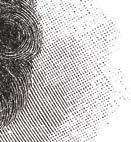

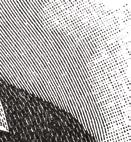













(Christianity) Baptism is when a new baby is welcomed into the church, and holy (religious) water put on their head.





William’s baptism was written in Latin in a church book. Gulielmus filius Johannes Shakspere, which means William, son of John Shakespeare.
Dossier
Shakespeare’s Stratford-Upon-Avon was a busy market town, with a population of 2,500.

Shakespeare’s birthday is traditionally celebrated on 23rd April.

‘Small Latin and Less Greek’ William’s home was close to King Edward’s Grammar School where he almost certainly studied between the ages of seven and fourteen. There are no documents from this time, so how do we know this?
The countryside around Stratford is recreated in Shakespeare’s plays. They include 65 species of bird, as well as his local Forest of Arden.
From his writing, we can see he knew rhetoric – the art of using language to persuade – and stories from Ancient Greece and Rome. But Shakespeare didn’t go to university or study to a high level. His playwright friend, and sometimes competitor,
Shakespeare in Love
When William was 18, he married Anne Hathaway. Their first child, Susanna, was born soon after in May 1583.
This school was started in the 1200s. Only boys from wealthy families went to school. Very few girls got an education at this time.
Ben Jonson, laughed at him for his ‘small Latin and less Greek’, and so did others who we will meet later.


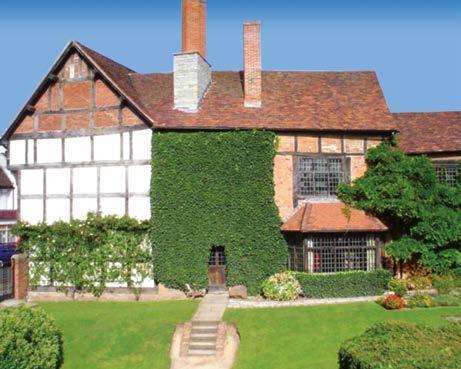
Shakespeare often wrote about love. Then, as now, love stories were popular. ‘The course of true love never did run smooth.’
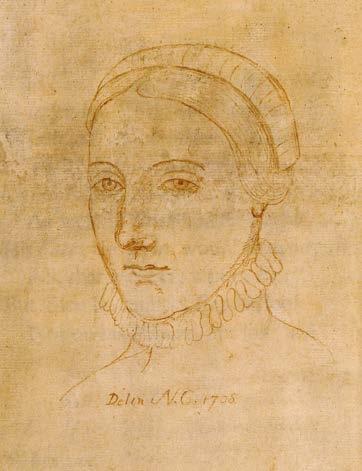

A Midsummer Night’s Dream Act I, Scene 1







In 1596, Hamnet dies at the age of eleven. Was this sad time the inspiration for William’s plays Hamlet and Romeo and Juliet?
The Mystery Years
In 1585, Shakespeare’s twins Judith and Hamnet were born. After that, William disappears from the historical records until 1592. What happened in those seven years? We can only guess.
Upstart Crow
A crow is a large, common bird with black feathers. It has a wide diet, including dead animals.





Perhaps Greene was jealous?
New Place






In 1592 a book was published where Shakespeare is described as a common bird with a high opinion of himself – an ‘upstart crow’. The writer, Robert Greene, said Shakespeare had ‘stolen’ his ideas. On top of that, he was an actor and businessman, and hadn’t even been to university!

















In 1597 Shakespeare bought a big house in Stratford – New Place, and after that, between 1589–1618, produced the plays we know today. He was a wealthy man.
Shakespeare is called the greatest writer in the English language. Ben Jonson described him as being ‘not for an Age [period of time] but for all time’.











You can still visit Shakespeare’s birthplace, his wife Anne Hathaway’s cottage, and the site of New Place (destroyed in 1759). Go to shakespeare.org.uk for details and photos.
8
’.
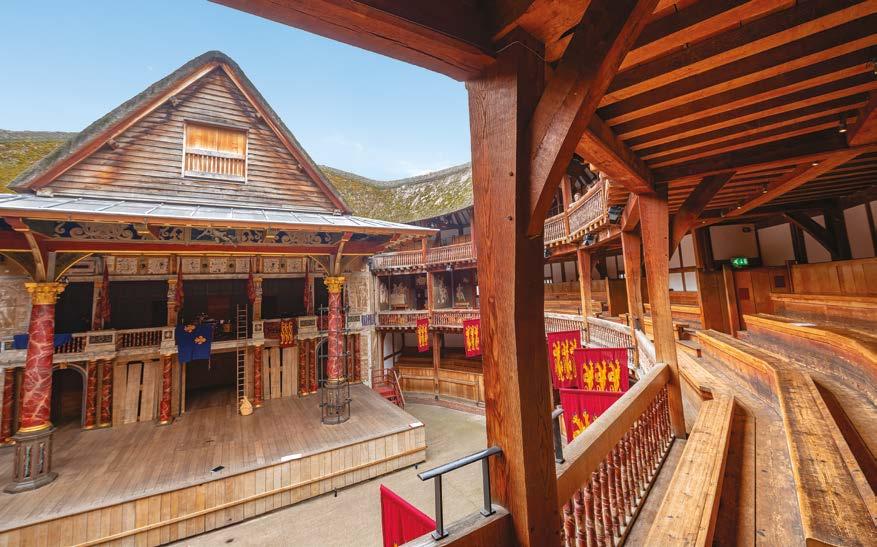
The Chamberlain’s Men
From 1594 Shakespeare wrote for The Chamberlain’s Men – who became the most famous group of actors in London. They played for Queen Elizabeth I, who loved the theatre.
Only men could appear on stage at this time – all female characters were played by young men who were described at the time as great actors.
The
Globe
In 1599, the group built The Globe theatre, south of the River Thames (there’s more on The Globe later). Here, many of Shakespeare’s greatest plays were first performed.
Theatre words in this play
Theatre was very popular in England at this time –The Globe was big enough for 3000 people.













Act similar to a chapter in a novel Scene short section of a play, usually with a change of actors and place
Shakespeare died in Stratford on 23 April 1616 – possibly after an evening drinking with his friend Ben Jonson.



Stage physical space where actors act [enter] when a character appears on stage [exeunt] Latin = they leave the stage [exit] one person leaves the stage
Prologue introduction to the play
[stage directions] Shakespeare gave few instructions to his directors and actors.
9
tybalt
A Capulet, cousin of Juliet, protects his family. He is violent.
Characters
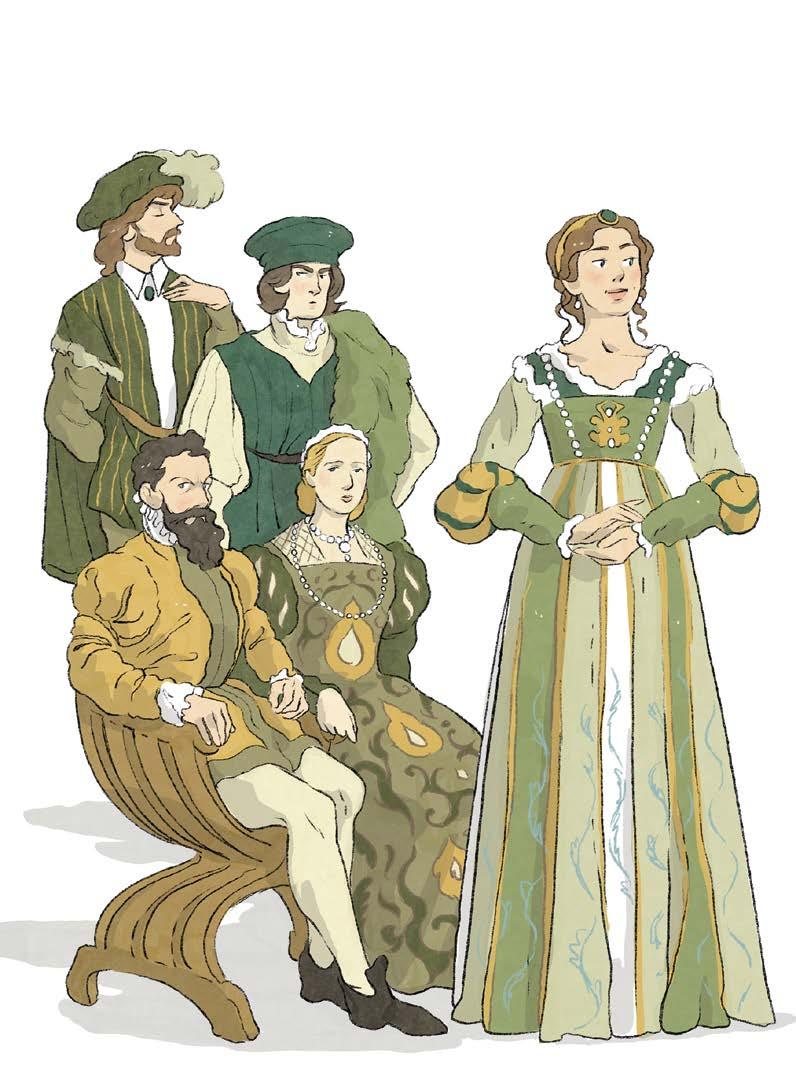
capulet
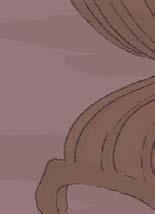
Father of Juliet, head of Capulet family, enjoys parties. He is an angry man, makes everyone do as he says.
paris
Relative of Prince Escalus (the most powerful man in Verona), wishes to marry Juliet. He is calm and handsome.

juliet
Only child of Capulet and his wife, brave and brilliant, in love with Romeo.
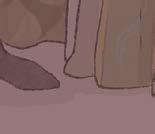
lady capulet Juliet’s mother, a cold woman, not close to her only daughter.
A

romeo
Montague, loves Juliet deeply. Sometimes he acts without thinking.
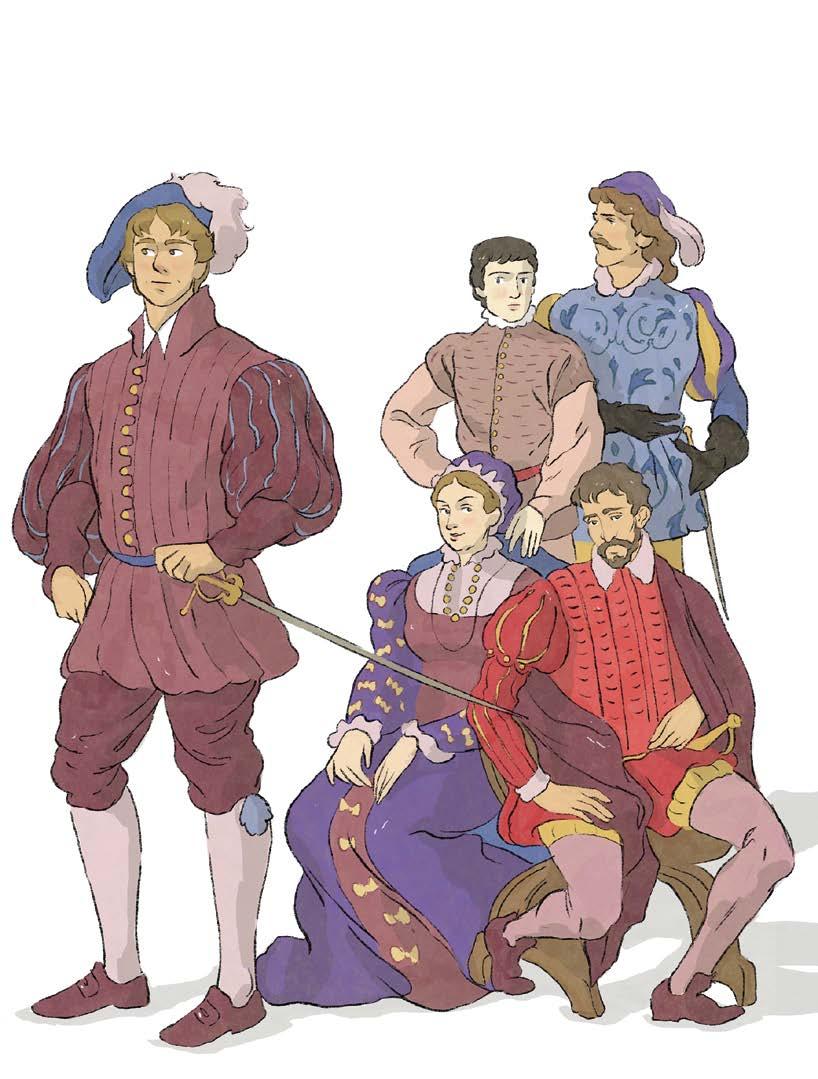
benvolio Romeo’s cousin and one of his best friends, kind and thoughtful, likes to keep the peace.
mercutio Romeo’s friend, relative of the Prince, quick thinker, likes to joke and laugh. He is always ready for a fight.
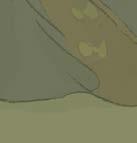
Loves her son, prefers peace to fighting.

Romeo’s father, like Capulet, is a proud man.
montague
lady montague
Vocabulary of Family and Character
1a In Romeo and Juliet, two families – the Capulets and the Montagues – hate each other. Study the characters on the previous pages, then fill the gaps with words from the box, and add an adjective to describe each person. The first is done for you.
cousin (x2) – daughter – friend (x2) – head – husband –mother (x2) – relative – father (x2) – son
Adjectives
thoughtful – angry – proud – brave – violent – calm –quick – cold – emotional – loving
Juliet is the only of Capulet and Lady Capulet.
1 Capulet is of the Capulets and Juliet’s .
2 Lady Capulet is Juliet’s
3 Tybalt is Juliet’s .
4 Paris hopes to be Juliet’s .
5 Romeo is the of Montague and Lady Montague.
6 Montague is Romeo’s .
7 Lady Montague is Romeo’s .
8 Benvolio is Romeo’s and
9 Mercutio is Romeo’s and a of the Prince.
1b Match the names of these other characters with the description you think most likely.
A Sampson and Gregory B Rosaline C Friar Laurence D Nurse
1 __________ has looked after Juliet since she was a baby, loves her like a daughter.
2 two men of the house of Montague.
3 __________ a man of the church, good friend to Romeo and Juliet.
4 __________ cousin of Juliet; Romeo is in love with her.
12 PRE-READING ACTIVITIES
daughter brave
Listening and Vocabulary – The Language of Shakespeare
2a Read this modern translation of the start of Romeo and Juliet.
PROLOGUE
In lovely Verona, where our play takes place, two unlucky lovers take their life, and when they die, they end their parents’ fights. The terrible story of a love that ends in death, and their parents’ many years of violent anger will, for the next two hours, be the work of our actors on our stage.
2b Listen to the Prologue from the start of Romeo and Juliet.
2c Now read the Prologue, and use the definitions to help you fill in the gaps.
PROLOGUE
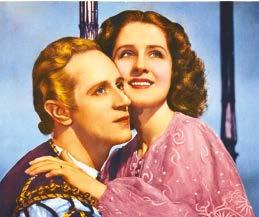
In (1) Verona, where we (2) our scene, two (3) lovers take their life; and with their death (4) their parents’ (5) . The terrible story of their (6) , and the continuation of their parents’ (7) , is now the two hours’ (8) of our stage.
bury (here) end forever (you bury people after they die) death-marked love (adjective invented by Shakespeare) death has been part of this love from the start fair (Early Modern English) lovely, beautiful rage strong, violent anger set place, put star-crossed (adjective invented by Shakespeare) here, stars mean luck or fortune, while crossed is negative strife (here) fight traffic (here, Early Modern English) business, work
2d What do you notice about the language that Shakespeare uses?
13
2
Vocabulary – The Language of Shakespeare II
3a Use the ‘Shakespeare Dictionary’ to help you understand this most famous speech of Romeo’s friend, Mercutio.
romeo I had a strange dream tonight.
mercutio Then I see Queen Mab has been with you. She is the fairy queen, and is no bigger than an agatestone, her wagon-spokes are made of long spiders’ legs, the traces are of the smallest spider’s web, her driver is a small grey-coated gnat, her chariot is an empty hazelnut. And in this way she rides night after night through lovers’ brains, and then they dream of love.







agate stone coloured stone used in a ring chariot/wagon has wheels, pulled by horses to carry people/things fairy magical being like a tiny person; not always kind gnat small, biting insect, like a mosquito hazelnut small, round brown nut


Shakespeare Dictionary





Queen Mab magical being from traditional English stories, or invented by Shakespeare – no one is sure! spokes straight pieces that go out from the centre of a wooden/ bicycle wheel traces ropes used by horses to pull a wagon.







3b Now decide if the following sentences are true or false.
1 Queen Mab is a magical being from traditional English stories.
2 Queen Mab travels on a stone.
3 Her wheels are made of spiders.
4 A small flying insect drives her around.
5 She sits inside an empty nut wearing a coat.
6 She travels through the minds of people in love, and feeds them dreams.
3c Do you like Mercutio’s explanation of where dreams come from? Why? / Why not?
14 FINAL TEST PRE-READING ACTIVITIES
T F
3
Listening Comprehension
4a Listen to Act I, Scene I. What happens?
Writing and Summarising
4b Use the words in the box to write a description of life in Shakespeare’s Verona.
swords – death – public – street – house – fight –citizens – weapons – peace – hate – Capulet –Montague – Prince – dancing – music – love
4c What would you like about life in Romeo and Juliet’s Verona?
4d What would you dislike about this life?
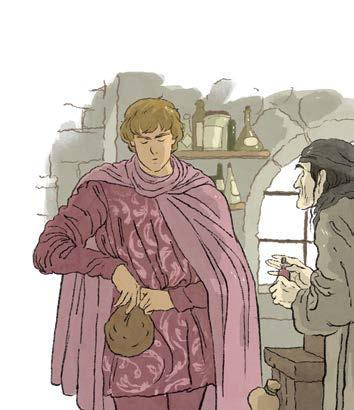

ACT I
‘My only love sprung* from my only hate!’
The Prologue tells us what to expect in this story.
2 3
Here, house means family members and anyone who works for the family.
To call someone a dog in Elizabethan England was very rude.
PROLOGUE
In fair Verona, where we set our scene, two star-crossed lovers take their life; and with their death bury their parents’ strife. The terrible story of their death-marked love, and the continuation of their parents’ rage, is now the two hours’ traffic of our stage.
SCENE I: Verona. A public place.
[Enter sampson and gregory, of the house of Capulet, with swords*. After them come Montague men]
sampson A dog of the house of Montague is come.
gregory The fight is between our masters* and us their men.
sampson Fight, if you are men. [The men fight with swords, enter benvolio]
benvolio [Takes out his sword] Stop, fools*! Put away your swords, you don’t know what you’re doing. [Tries to stop the fight. Enter tybalt]
sprung suddenly come from; jumped out swords long sharp lengths of metal, used for fighting masters (here) heads of the Capulet and Montague houses fools stupid people
16
I ‘My only love sprung from my only hate!’
tybalt Why do you fight these idiots? Fight me, Benvolio, prepare to die.
benvolio I only want to keep the peace. Put away your sword, or use it to stop these men with me.
tybalt What*! Fight and talk of peace! I hate that word, as I hate all Montagues, and you.
[They fight. Enter more men from the houses of capulet and montague; then citizens, with weapons*]
We meet Tybalt, an angry and violent member of the Capulet family.
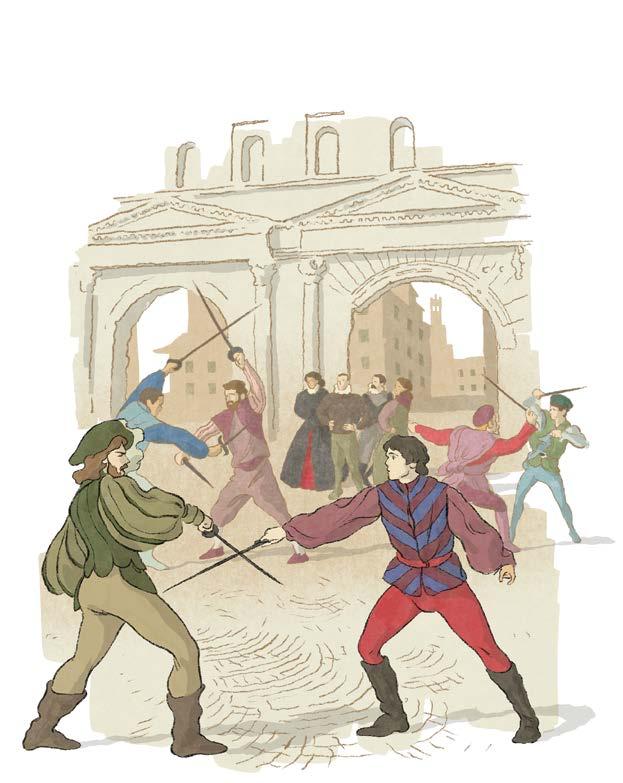
what (here) expression of surprise weapons guns, knives, bombs –these are weapons
The ordinary people of Verona are tired of the fights between the Capulets and the Montagues.
“What! Fight and talk of peace! I hate that word, as I hate all Montagues, and you.”
17
ACT
The Prince has power in this city. Even these two powerful families should do as he says.
By describing the weapons as angry (rather than the people using them)
Shakespeare brings to life the violence and danger of the fight.
In Shakespeare’s England you could be killed if you broke the law (the rules of the country).
The Prince tells the men twice that they’ll be killed if they’re found fighting in the streets again.
Paris is the name of the prince of Troy in Homer’s Iliad who takes the beautiful Helen from her home.
Capulet means ‘get her to fall in love with you’.
At this time, English marriages were often arranged by parents, but it was preferred if the couple liked or loved each other.
citizens Down with the Capulets! Down with the Montagues!
[Enter capulet, lady capulet, montague, lady montague]
capulet What noise is this? Give me my sword!
montague You villain* Capulet.
[Enter prince, with servants*]
prince Rebellious* subjects, enemies to peace, throw your angry weapons to the ground. If you ever upset our streets again, you will pay with your lives. Once more, on pain of death, all men depart.
[Exeunt all but benvolio. Enter romeo looking sad]
benvolio What sadness lengthens* Romeo’s hours? Are you in love?
romeo No! Fair Rosaline has abandoned* love.
benvolio Then forget her, find another beauty.
romeo You cannot teach me to forget! [Exeunt]
SCENE II: A street.
capulet Gentle Paris, win Juliet’s heart and she will be yours. Come to my house tonight. [To servant, 4
[Enter capulet, paris, and servant]
paris My lord, what do you say to my request to marry fair Juliet?
villain very bad, cruel person servants (in the past) people paid to look after you/your house rebellious (adjective) describing someone who doesn’t follow the rules of a place or country lengthens makes longer abandon give up completely
18 William
Romeo
Shakespeare
and Juliet
I ‘My only love sprung from my only hate!’
giving a paper] In fair Verona find these people and say to them, my house welcomes them tonight.
[Exeunt capulet and paris]
servant How can I? I can’t read. [Enter benvolio, romeo] Sirs, can you read?
romeo [Reads the paper]. Good names! Who invites them?
servant My master, Capulet, and if you aren’t Montagues, come, drink a cup of wine with us tonight. [Exit]
benvolio Lovely Rosaline will be at Capulet’s feast*. Go, compare* her with others I will show, and I will make you think your swan a crow.
romeo I’ll go, but even the all-seeing* sun never saw her equal.
SCENE III: Capulet’s house.
[lady capulet, nurse, juliet]
lady capulet Daughter Juliet, Paris asks for you for his wife. Tonight you will see him at our feast. What do you say? Can you love him?
juliet I’ll look to like, but can promise no more than that.
Around 30% of men and 10% of women could read in Shakespeare’s time. In Shakespeare’s plays, servants are often used to bring humour to a play.
feast (here) party, with food, music and dancing compare look for the differences between two or more things all-seeing (poetic) that sees everything
Benvolio and Romeo are Montagues! They will wear masks at Capulet’s feast to hide who they really are.
Benvolio says – for Romeo, Rosaline is a beautiful white bird (a swan) but when he sees other women he will understand she’s a much less beautiful bird (a crow).
Juliet means she will look at Paris positively.
19 ACT
Mercutio’s Queen Mab speech is one of the most famous in all of Shakespeare’s plays.
In Shakespeare‘s time, ‘Peace!‘ in this context meant ‘Be quiet‘ or ‘Stop speaking‘.
“Oh, then, dear saint, let lips do what hands do.”
SCENE IV: Outside Capulet’s house.
[Enter romeo, mercutio, benvolio wearing masks]
romeo My feet are too heavy for dancing. I had a strange dream tonight.
mercutio Then I see Queen Mab has been with you. She is the fairy queen, and is no bigger than an agate-stone, her wagon-spokes are made of long spiders’ legs, the traces are of the smallest spider’s web, her driver is a small grey-coated gnat, her chariot is an empty hazelnut. And in this way she rides night after night through lovers’ brains, and then they dream of love.
romeo Peace, Mercutio! You talk of nothing.
mercutio True, I talk of dreams which are the children of a lazy brain.
SCENE V: Capulet’s house.
[Enter capulet, juliet and others of his house, meeting the guests]
capulet Welcome, gentlemen! Ah ha, my ladies! Which of you will dance? Come, musicians, play!
romeo [Sees juliet dancing] She shines like a jewel. Was I in love before now? I think not. I never saw true beauty until tonight.
20
William Shakespeare Romeo and Juliet
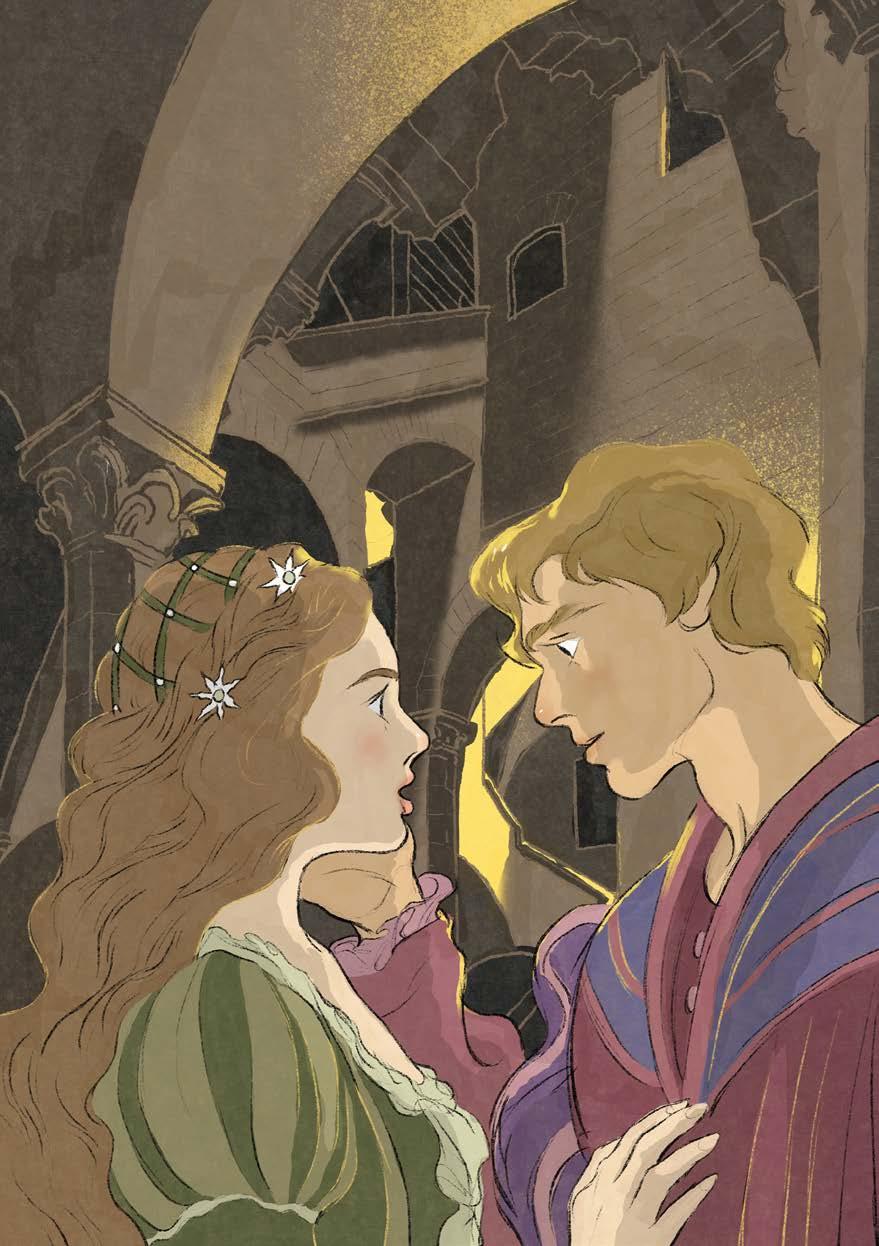
Like the other guests, Romeo is wearing a mask. Tybalt recognises him from his voice.
(Christianity) For Romeo, Juliet is a saint – an extraordinary and perfect person.
(Christianity) Pilgrims make long journeys to churches or other holy places, to ‘pay’ for bad behaviour, or to show their love for God.
tybalt This, by his voice, is a Montague, how dare* he come here?
capulet [To tybalt] Kinsman*! Why are you angry? Is that young Romeo? Gentle cousin, leave him alone. I hear he is a good youth.
tybalt I’ll remove him.
capulet Leave him alone. Am I the master here, or you?
tybalt I will do as you say, but I’ll not forget this.
SCENE VI: In a quiet part of Capulet’s house.
romeo [Taking juliet’s hand] Dear saint*, if my hand feels too rough*, then I’ll make it better with a gentle kiss.
juliet Good pilgrim, you criticise* your hand too much, even saints have hands that pilgrims’ hands can touch.
romeo Do saints not have lips?
juliet Yes, pilgrim, lips that they must use in prayer*.
Nurse protects Juliet. She arrives to stop Juliet talking with Romeo (and, if she has seen it, their kissing).
romeo O, then, dear saint, let lips do what hands do. [They kiss]
nurse Madam, your mother wants a word. [juliet goes]
romeo Who is her mother?
dare have the courage to do something kinsman (Early Modern English, pl. kinsmen) man from the same family as you saint (Christianity) holy person, e.g. Saint Francis, dedicated to God rough (here) not soft criticise make a negative judgement about something prayer (here, Christianity) a request of help from God
William Shakespeare Romeo and Juliet
22
I ‘My only love sprung from my only hate!’
nurse Young sir, her mother is the lady of this house.
romeo Is she a Capulet? Then I am forever in debt* to my enemy.
benvolio Away, let’s go; we’ve had the best of it.
romeo Yes, I fear that’s so.
capulet I thank you, honest gentlemen, good night.
[Exeunt all but juliet and nurse]
juliet Nurse, who was that gentleman who would not dance? If he’s already married, then I will surely go to my death unmarried.
nurse His name is Romeo, and a Montague – the only son of your enemy.
juliet My only love sprung from my only hate! Oh monstrous* love that makes me love a hated enemy.
nurse What’s this? What’s this? Come, let’s go, the strangers all are gone.
debt (here) when you feel grateful to someone for something monstrous adjective from monster
ACT
Benvolio means that the party is ending.
23
Romeo said his feet were too heavy for dancing.
Reading for Overall Understanding
1 Put these events from Act I in the correct order.
A Paris asks Capulet if he can marry his daughter.
B Capulet allows Romeo to stay.
C Romeo and Juliet meet, and immediately fall in love.
D The Capulets and Montagues start to fight in the streets of Verona.
E Romeo and his friends are Montagues but decide to go to Capulet’s party.
F One of the Capulets recognises Romeo, and wants to send him away.
G The ordinary people get angry with both families, and try to stop the fight.
H Romeo learns about Capulet’s party when asked to read an invitation.
I The Prince of Verona tries to keep control of the situation.
J Romeo learns that his love is the daughter of his enemy Capulet.
Writing for Overall Understanding
2 What do you know about these characters? Use complete sentences.



24 CHECK IT OUT
1
2
3
Juliet
Romeo
Tybalt
Grammar – Questions
1a Who asks the following questions – Capulet (C), Tybalt (T), or Romeo (R)? The first is done as an example.
Which of you will dance? ✔
1 Was I in love before now?
2 How dare he come here?
3 Why are you angry?
4 Is that young Romeo?
5 Am I the master here, or you?
1b What do the characters mean with their questions? The first is done as an example.
Capulet wants to get the party started. He's encouraging everyone to dance.
1c Shakespeare uses questions brilliantly in his writing – they add energy and drama. Do you agree with the following statements? Give examples.
1 Questions help us understand relationships between characters in this play.
2 Questions always need an answer.
25 SPOT ON GRAMMAR
C T R
1 2 3 4 5
Reading for Specific Information
Read the texts (A-H) then match each one with an explanation (1-7) below. Use each text once only. The first one (0) has been done for you as an example.
0 C Someone wants to stop someone doing what they’re doing.
1 Someone doesn’t believe the person they’re talking to.
2 Someone orders someone to do what they’re told.
3 Someone sees an enemy arrive.
4 Someone warns someone else about their behaviour.
5 Someone says they must do something because of who they work for.
6 Someone has lost patience with someone else.
7 Someone wants to hurt someone else.
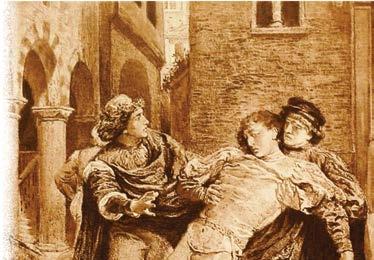
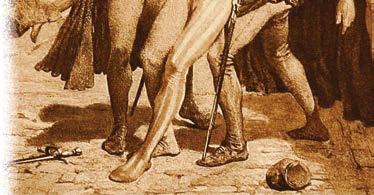
A A dog of the house of Montague is come.
B The fight is between our masters and us their men.
C Stop, fools! Put away your swords, you don’t know what you’re doing.
D Why do you fight these idiots? Fight me, Benvolio, prepare to die.
E What! Fight and talk of peace! I hate that word, as I hate all Montagues, and you.
F Down with the Capulets! Down with the Montagues!
G Rebellious subjects, enemies to peace, throw your angry weapons to the ground.
H If you ever upset our streets again, you will pay with your lives.

26 FOCUS ON YOUR EXAMS
PRELIMINARY
The 2030 Agenda Goal 16: Peace
Sharing and Discussing Ideas




1 Discuss your answers to the questions in pairs.
1a Read what the UN says about peace.


Peace – We will work to support peaceful and equal societies which include everyone, and which are free from fear and violence.
1b How can societies stay peaceful, equal and inclusive?
2a Read what Benvolio says and does when he sees the fight.

BENVOLIO [takes out his sword] Stop, fools! Put away your swords, you don’t know what you’re doing.
2b Is Benvolio right to use his sword to stop the fight, or do you agree with Tybalt when he says “What! Fight and talk of peace!”? Why?/Why not?
3a Read what the prince says when he sees fighting in the streets again.

PRINCE Rebellious subjects, enemies to peace, throw your angry weapons to the ground. If you ever upset our streets again, you will pay with your lives. Once more, on pain of death, all men depart.
3b Do you think the prince will stop the fighting? Why?/Why not?
Speaking – Discussing Opinions
2 In the next act, we see Romeo and Juliet make some important decisions, but Benvolio says ‘Love is blind’. What do you think he means?
27 THINK ON!

ACT II
‘Parting* is such sweet sorrow*.’
Mercutio wants to annoy Romeo – if Romeo gets angry with him, perhaps he will speak, and they will find him.
Mercutio is telling Romeo to say a silly love poem.
This traditional English saying means ‘love makes you unable to see anything wrong with the person you love’.
Benvolio is making a joke – a play on words.
5
SCENE I: A small road by the wall of Capulet’s garden.
[Enter romeo]
romeo How can I go forwards when my heart is here? Turn, heavy heart! Go and find what pulls you back.
[He climbs over Capulet’s wall. Enter benvolio and mercutio]
benvolio [Calling] Romeo! My cousin Romeo!
mercutio He is wise* and has gone home to bed.
benvolio He jumped over that garden wall. Call him, good Mercutio.
mercutio [Calling] Romeo! Madman! Lover! Let us know where you are with a lover’s sigh. Cry ‘Alas!’, rhyme* ‘love’ and ‘dove*’.
benvolio Come, he has hidden himself in these trees to be alone with the night. His love is blind, that’s why he loves the dark.
parting (formal) saying goodbye, departing sorrow strong feeling of sadness wise intelligent, making good decisions rhyme use two words that sound similar, e.g. when writing a poem dove white bird, symbol of purity and love
28
mercutio If love is blind, love will not find its way. [Calling] Romeo, good night, I’m off to my bed in a house – this bed in a field is too cold for me.
benvolio Yes, let’s go. We’ll not find him if he doesn’t want to be found. [Exeunt]
SCENE II: Capulet’s garden.
[Enter romeo, unseen by juliet]
romeo [juliet is on her balcony] Shh! What light shines from that window? It is the light of dawn* and Juliet is the sun. It is my lady. O, it is my love!
juliet [Speaking into the night] Alas!
romeo [Quietly] She speaks. O, speak again, bright angel!
juliet O Romeo, Romeo! Where are you Romeo? Deny* your father and refuse your name, or, if you will not, then swear* you are my love and I’ll no longer be a Capulet.
romeo [Speaking to himself ] Shall I hear more, or shall I speak at this?
juliet It is only your name that is my enemy. What’s Montague? It is neither hand, or foot, not arm, or face. Choose another name! What’s in a name?
This is the most famous scene in the play – Romeo is in the garden of the Capulets. Juliet is standing on her balcony.
Shakespeare is known for his powerful images – for Romeo, Juliet shines like the sun.
Mercutio doesn’t want to sleep outside. Juliet wants Romeo to leave his family and change his name. If Romeo will not leave his family, then Juliet will leave hers – but only if he really loves her.
dawn the first light of a new day Deny (here) refuse to accept swear promise
29 ACT II ‘Parting is such sweet sorrow.’
William Shakespeare Romeo and Juliet
“If you call me your love, then I'll take a new name.”
The flower we call a rose by any other name would smell as sweet.
Romeo makes himself known to Juliet.
Shakespeare is using poetic language. She is ‘drinking’ his words – she loves to hear Romeo speak.
romeo [To juliet] If you call me your love, then I’ll take a new name. From this moment I will never be Romeo.
juliet My ears have not yet drunk a hundred words of that voice, but I know it. Are you not Romeo and a Montague? Leave! This place is death for you. If any of my kinsmen find you here they will murder you.
Romeo means he would not want to live without Juliet’s love.
romeo I have the dark night to hide me. But if you don’t love me, let them find me. I’d rather my life was ended by their hate than have a living death without your love.
juliet Do you love me? Do you really love me? Tell me the truth.
In Shakespeare’s time, the moon was often associated with love.
The moon has several phases through the month, from the new moon to the full moon – the moon, in Juliet’s mind is not a symbol of trust.
romeo Lady, by this lovely moon I swear --
juliet O, do not swear by the moon, the moon changes her appearance through the month, I do not want your love to be as changeable* as her.
romeo What shall I swear by?
juliet Do not swear at all. I’m happy to see you, but not so happy to meet again so soon.
changeable (adjective) something that changes a lot
30
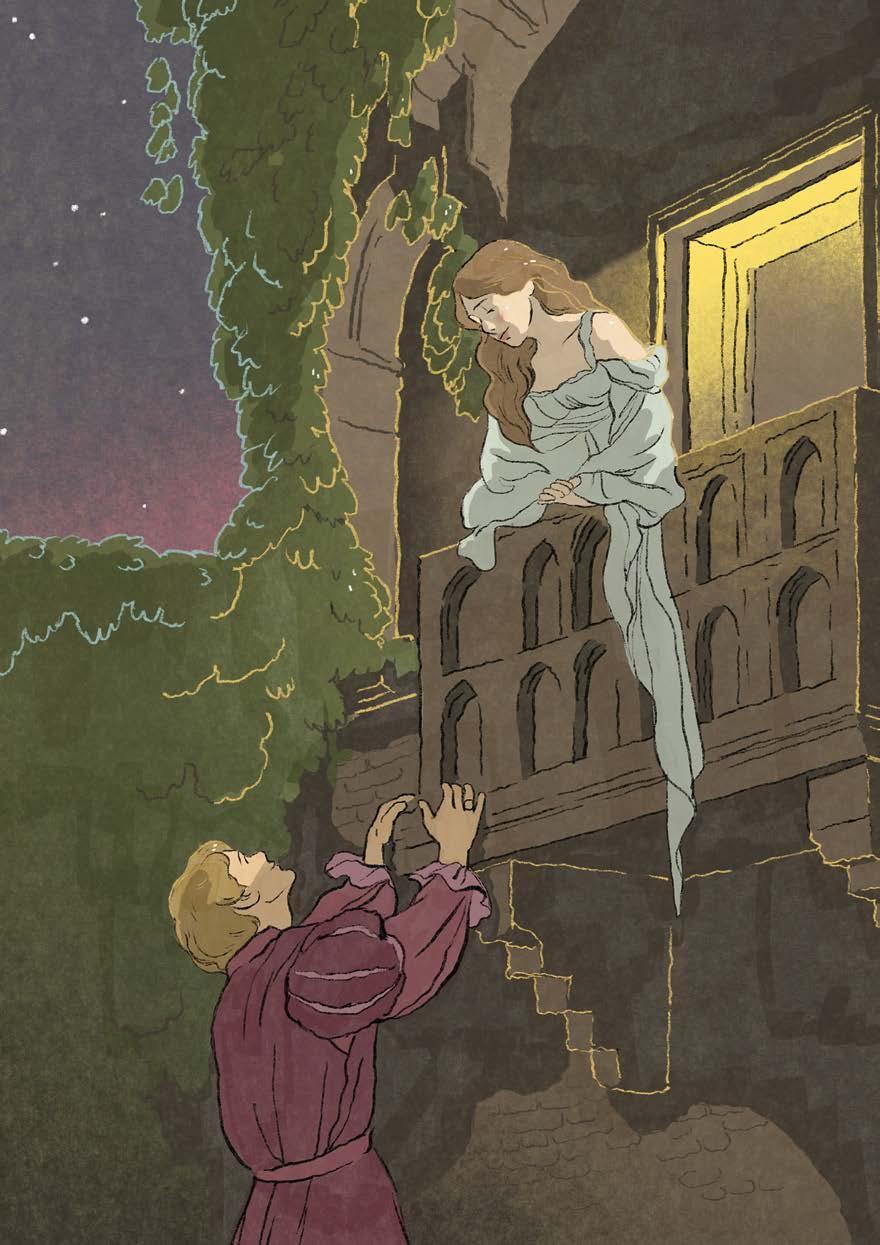 William Shakespeare Romeo and Juliet
William Shakespeare Romeo and Juliet
Juliet is worried that their love is so sudden it will be over as quickly as it started – like a flash of lightning.
Juliet says they should take their time, allow their love to develop more slowly, and more naturally, like a flower.
Juliet is careful to protect herself in case Romeo is dishonest about what he wants from her.
At this time, English law gave husbands control over their wives.
It is too unwise*, too sudden. It is too much like the lightning which ends even before you can say ‘It’s light’. Go! I wish you a sweet, good night! Through the summer, this first young bud* of love will become a beautiful flower. [nurse calls; to nurse] Coming, good nurse! [To romeo] Sweet Montague, stay a while, I will come again. [Exit]
romeo O wonderful, wonderful night! But I’m afraid all this is a dream. [Re-enter juliet, above]
juliet Dear Romeo, if your love is true, if your plan is to marry me, send me word tomorrow by a messenger* that I’ll send to you. Tell me where and what time we can be married, then I will lay my life at your feet, and follow you, my husband, through the world.
nurse [In Juliet’s room] Madam!
juliet [To nurse] Coming! [To romeo] A thousand times good night! [Exit]
[Re-enter juliet, above]
juliet Romeo!
romeo My dear?
juliet At what time tomorrow shall I send my messenger to you?
romeo At nine.
unwise (opposite of wise) not a good idea bud on a plant, small growth that develops into a flower messenger person that takes and receives messages
32
II ‘Parting is such sweet sorrow.’
juliet Goodbye! Until tomorrow, though it will feel like twenty years until then. [Calling] Romeo! O, I have forgotten why I called you back.
romeo Let me stand here till you remember it.
juliet No, it’s almost morning, you must go. Good night, good night! Parting is such sweet sorrow that I shall say good night till it be morrow*. [Exit above]
morrow [early Modern English] morning
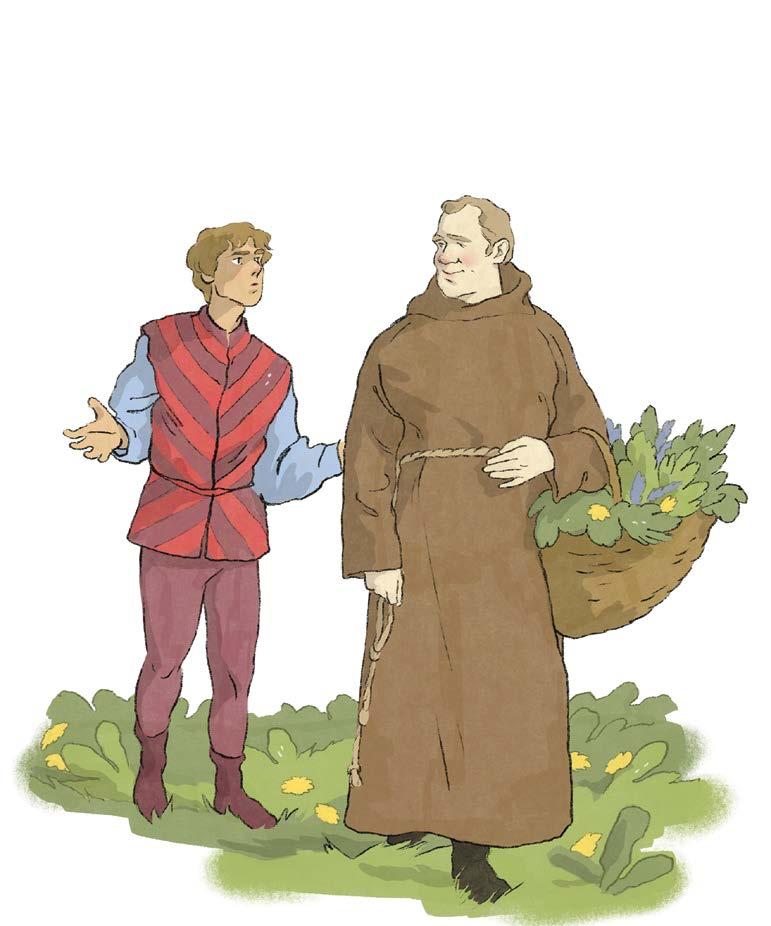
“But you told me I was wrong for loving Rosaline.”
Juliet is excitable – she changes her mind, forgets things – Shakespeare is showing us how much in love she is.
Juliet is worried Romeo will be found by her kinsmen.
In this famous line, Shakespeare describes the mixed emotions the young lovers feel – sad to leave each other, but already thinking about the next time they meet.
ACT
A friar is a man of the church, who serves God. Friar Laurence is a friend to Romeo and Juliet.
Friar Laurence says that all plants can be useful if you know how to use them – they can do good (medicine) and bad (kill people).
Friar Laurence is repeating ideas on medicine from the Roman–Greek, Galen (129–216 CE) and Swiss philosopher, Paracelsus (died 1541).
romeo Let sleep rest on your eyes, let peace be in your heart! I will go to Friar Laurence to ask for his help, and tell him of my love. [Exit]
SCENE III: Friar Laurence’s
garden.
[Enter friar laurence, with a basket]
friar laurence The grey morning smiles on the dark night, I must fill this basket. See this little flower! It holds both poison* and medicine. Smell it and it is sweet, but eat it and it will stop your heart.
[Enter romeo]
romeo Good day, father.
friar laurence God bless you! Up so early? I’m guessing our Romeo has not been to bed tonight. God forgive you! Were you with Rosaline?
romeo With Rosaline, my holy father? No. I have forgotten that name, and the tears I cried for it.
Friar Laurence is Romeo’s teacher. ‘My son’ shows what a close relationship they have.
friar laurence That’s good my son, but where have you been?
romeo I’ve been dancing with my enemy, and now my heart is set* on the lovely daughter of rich Capulet, and hers on mine. How we fell in love, I will tell you later. For now I ask you this, that you will agree to marry us today.
poison if you drink or eat poison it could make you ill or kill you set your heart on something want something very much
William
Romeo
Shakespeare
and Juliet
34
friar laurence Holy Saint Francis, what a change is here! Is Rosaline so soon forgotten?
romeo But you told me I was wrong for loving Rosaline.
friar laurence For loving her too much my son. But come, young indecisive* friend, I will help because I hope your happy marriage will turn the hatred of your two houses to pure love.
romeo O, let’s go. I’m in a hurry.
friar laurence Go wisely* and slowly. Run fast and you will fall. [Exeunt]
indecisive not decisive, i.e. someone who cannot make decisions wisely in a wise way, thinking carefully
ACT
‘Parting
sweet sorrow.’
II
is such
35
Reading Comprehension – Multiple Choice
1 Choose the correct option to complete the sentence.
1 Romeo climbs over the wall of the Capulets’ garden because…
A he wants to hide from his friends.
B he loves the dark.
C he has to follow his heart.
2 Juliet asks Romeo to choose another name because…
A it is only his name that is her enemy.
B flowers smell sweet with their names.
C he is in danger if he stays in the Capulet garden.
3 Juliet tells Romeo not to swear by the moon because…
A the moon is like lightning.
B she’s worried his love will change if he does.
C she does not want him to swear at all.
4 Juliet asks Romeo if his plan is to marry her because…
A she’s worried he will love her, then leave her.
B she will lay her life at his feet.
C she will send him a messenger the next day.
5 Juliet says that ‘parting is such sweet sorrow’ because…
A it is almost morning.
B time will pass slowly until they see each other again.
C she knows she will see Romeo again the next day.
6 Friar Laurence agrees to marry the two young lovers because…
A he wants Romeo to slow down.
B he hopes the Capulets and Montagues will find peace.
C he doesn’t want Romeo to love Juliet too much.
36 CHECK IT OUT
The First Conditional – Imagined Situations
1 Match each imagined situation with its imagined result.
Imagined future situation
1 If love is blind,
2 … if he doesn’t want to be found.
3 Deny your father, or, if you will not,
4 If you call me your love,
5 If any of my kinsmen find you here,
6 If your plan is to marry me,
Future result
a I’ll send you a messenger.
b love will not find its way.
c they will murder you.
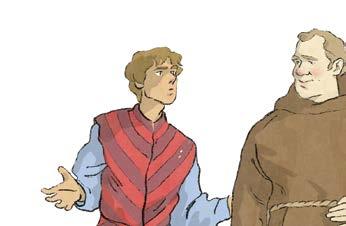
d then swear you are my love.
e We’ll not find him
f then I’ll take a new name.
Grammar – Tenses
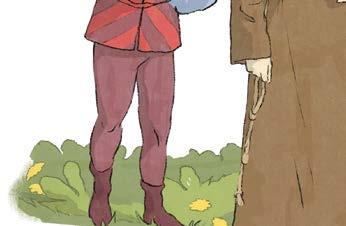
2 Put the verbs in the correct form.

friar laurence God bless you! Up so early? I (1) (guess) our Romeo (2) ________________ (not be) to bed tonight. God forgive you! Were you with Rosaline?
romeo With Rosaline, my holy father? No. I (3) (forget) that name, and the tears I (4) ________________ (cry) for it.
friar laurence That (5) (be) good my son, but where (6) ________________ (be)?
romeo I (7) ________________ (dance) with my enemy, and now my heart (8) ________________ (be) set on the lovely daughter of rich Capulet, and hers on mine.

37 SPOT ON GRAMMAR
Reading – True or False and Gap Fill
1 Read the text then decide if each sentence below is correct or incorrect. The first one (0) has been done for you. Then write the start of the sentence that helped you decide.
juliet O, do not swear by the moon, the moon changes her appearance through the month, I do not want your love to be as changeable as her.
romeo What shall I swear by?
juliet Do not swear at all. I’m happy to see you, but not so happy to meet again so soon. It is too unwise, too sudden. It is too much like the lightning which ends even before you can say ‘It’s light’. Go! I wish you a sweet, good night! Through the summer, this first young bud of love will become a beautiful flower. [nurse calls; to nurse] Coming, good nurse! [To romeo] Sweet Montague, stay a while, I will come again. [Exit]
0 Juliet wants to be sure that Romeo really loves her. ✔
O, do not swear by the moon…
1 Romeo wants to tell Juliet what to do.
2 Juliet feels that too much time has passed since they met.
3 Juliet is worried that their strong emotions will die as quickly as they appeared.
4 Juliet thinks they should take their time.
2 Formal writing
Imagine you are Friar Laurence. Write to a friend telling them what has happened, and why you have agreed to marry Romeo and Juliet.
38 FOCUS ON YOUR EXAMS
PRELIMINARY
T
F














Agreeing and Disagreeing
The WHO describes gender in the following way. “Gender refers to the characteristics of women, men, girls and boys that are socially constructed (made). This includes behaviours and roles associated with being a woman, man, girl or boy, as well as relationships with each other. As a social construct, gender varies from society to society and can change over time.”
1 Goal 5 of the UN’s Sustainable Development Goals talks about equality between genders. Discuss your answers to the questions in pairs.
a What freedoms does Juliet have? Where does she not have freedom?
b What freedoms does Romeo have that Juliet does not? What freedoms does she have that he does not?
c Is the relationship between Juliet and Romeo equal? Why?
Speaking and Listening
2 Act III is full of drama. Look at the words in the box and discuss what you think will happen. Then listen to the start of Act III –were you right?
Juliet – Romeo – Friar Laurence – marry –Mercutio – Benvolio – Tybalt – argument The 2030 Agenda Goal 5:
39 THINK ON!
6
Achieve gender equality and empower all women and girls.














































































































































 William Shakespeare Romeo and Juliet
William Shakespeare Romeo and Juliet







